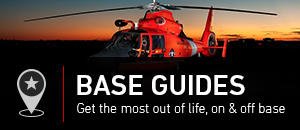When Andre Douglas was announced as part of NASA's 2021 astronaut candidate class, the Coast Guard Academy was euphoric. Cadets hung posters of Douglas, a 2008 academy graduate who served on active duty in the Coast Guard for seven years, and students and faculty followed his progress intently. Their level of pride rose even more after Douglas was one of 10 new astronauts the space agency officially revealed in March.
Since NASA introduced its first group of astronauts, the so-called “Mercury 7,” in 1959, Douglas' selection marked only the third time that a Coast Guard Academy graduate was chosen to fly into space. Cmdr. Bruce Melnick, who graduated in 1972, served as a mission specialist aboard Space Shuttle Discovery (STS-41) in 1990 and Space Shuttle Endeavour (STS-49) in 1992. Then 1985 graduate Capt. Daniel Burbank and went to space four times, including as a mission specialist on Space Shuttle Atlantis missions in 2000 (STS-106) and 2006 (STS-115).
"I feel like I'm in a really great spot to help foster that collaboration for the future," Douglas, who graduated in 2008, told Military.com of the potential of more Coast Guardsmen becoming astronauts.

Stationed at Johnson Space Center in Houston, Douglas is currently working on a pressurized lunar rover and a lunar terrain vehicle, as well as designing spacesuits, He is also involved in a project to develop a new lunar space station, Gateway, to support the Artemis missions, which aim to return astronauts to the moon this decade with an eye on eventually traveling to Mars.
Those responsibilities are on top of staying proficient in what he learned during the two-year astronaut training program.
"That's a wide variety of things," Douglas said. "The best shot of getting everything done is just being very flexible and admitting where you might be weaker in a certain area and asking for help if you need it and spending the time in those areas that you may want to get stronger in."

Originally from Virginia, Douglas was born in 1986 and comes from a military family. His father, Stanley Douglas, is a retired Coast Guard commander, and his mother, Robin Baulding, was a military nurse with ties to the Air Force, Marine Corps and Army Reserve, Douglas said.
From the time he was 7 years old, Douglas was fascinated by space, a passion encouraged by his mother. She introduced him to telescopes, and whenever he mentioned that he wanted to be an astronaut, his parents did not dissuade him. Unlike some children, whose career aspirations can change a few times every school year, Douglas was so steadfast in what he wanted to become that he even wrote a report on nuclear fission in the eighth grade.
"Earth is finite, but we can explore other universes or other galaxies, planets," Douglas said. "It's incredible."
Douglas holds a bachelor's degree in mechanical engineering from the Coast Guard Academy and four postgraduate degrees from other institutions. He served as a naval architect, salvage engineer, damage control assistant and officer of the deck in the Coast Guard from 2008 to 2015. After leaving active duty, Douglas focused on planetary defense, space exploration and maritime robotics during his stint as an engineer at the Johns Hopkins University Applied Physics Lab near Baltimore.
Two weeks after Douglas became an astronaut, he was commissioned as a commander in the Coast Guard Reserve. He also sits on Commandant of the Coast Guard Adm. Linda Fagan's Commandant's Advisory Group.
"A lot of different choices have led me to get where I am today," said Douglas, who expects to be assigned to his first space assignment in the next year.
Burbank, the former astronaut who teaches mechanical engineering at the academy in New London, Connecticut, told Military.com he stayed in touch with Douglas while he was going through the NASA program.
"We tend to limit our imagination and things that we can do," Burbank said. "There's an awful lot of [students] who would love to be part of the space program. They're all imagining all of the great things they're going to do in the Coast Guard, but their futures just became a little bit brighter to know that somebody with that background is now at NASA."
In NASA's history, 212 of 360 astronauts all time, or nearly 60%, have ties to the military. In the class revealed this year, Douglas was joined by Nichole Ayers and Anil Menon (Air Force), Marcos Berríos (Air National Guard), Luke Delaney (Marine Corps), Jack Hathaway and Jessica Wittner (Navy), and Deniz Burnham of the Navy Reserve. Christopher Williams and Christina Birch did not serve in the military, according to their NASA bios. Two United Arab Emirates astronauts, Nora AlMatrooshi and Mohammed AlMulla, also graduated in that class.
“I would be super surprised if it was otherwise, [but] there are going to be bootprints on the moon, courtesy of Andre Douglas and his crewmates, and that’s going to happen in the upcoming 5-10 years,” Burbank said.
The 2021 astronaut candidate class attracted more than 12,000 applicants, and when Douglas found out he made it, he was with his wife at their home. As they celebrated, they recalled the first time that Douglas clued her in on his dream of becoming an astronaut.
“It was just funny how it came full circle to reality,” Douglas said.
In that moment, the couple did the only thing that seemed appropriate, given the unlikeliness of it all. They laughed.
Want to Know More About the Military?
Be sure to get the latest news about the U.S. military, as well as critical info about how to join and all the benefits of service. Subscribe to Military.com and receive customized updates delivered straight to your inbox.













